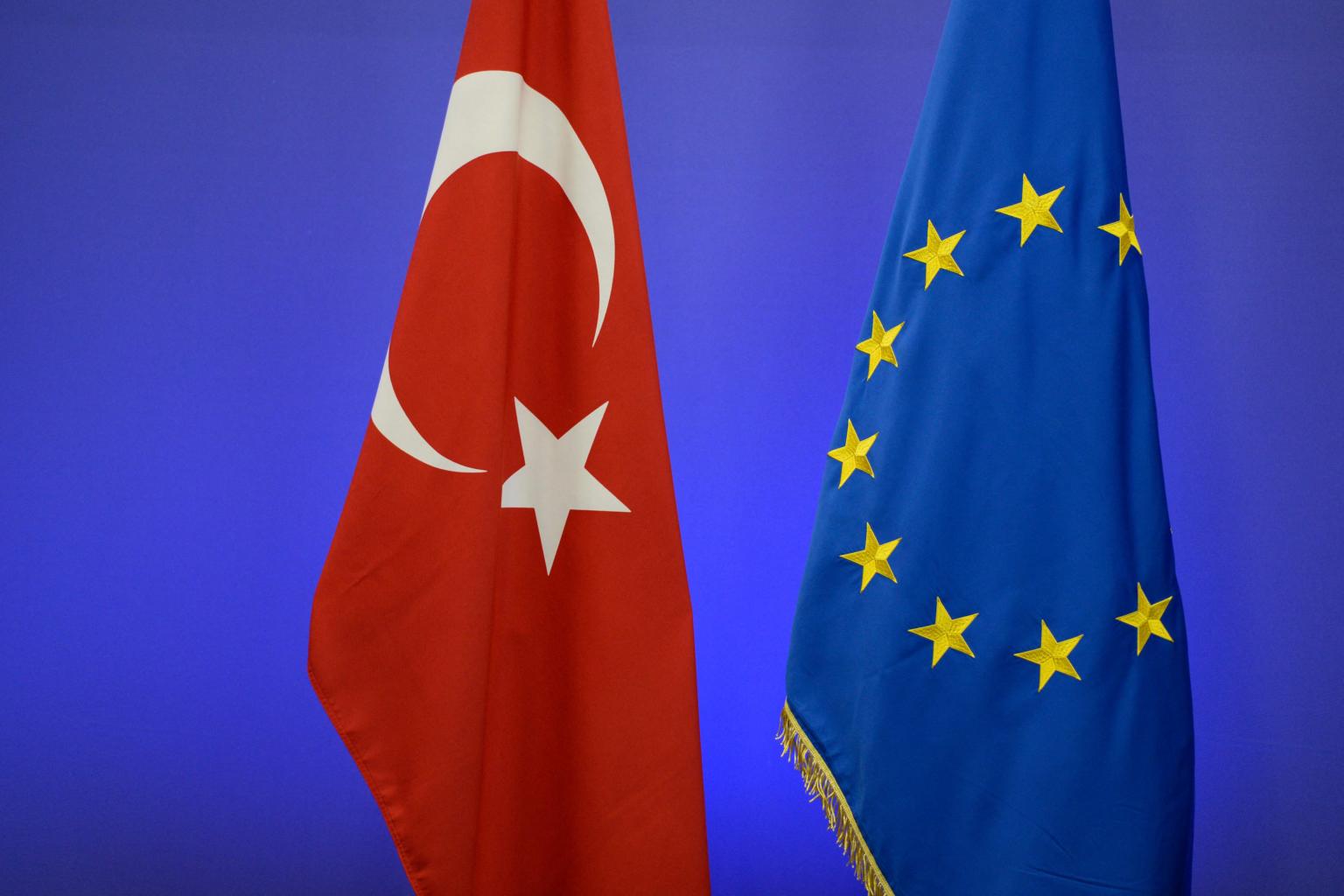Top EU officials seek 'new chapter' in ties with Turkey visit
Sign up now: Get ST's newsletters delivered to your inbox

The meeting in Ankara on Tuesday will provide a framework on the way forward, said an EU official.
PHOTO: AFP
BRUSSELS (AFP) - The European Union's top two officials head to Turkey on Tuesday (April 6) to lay out to President Recep Tayyip Erdogan the bloc's conditions for improved ties after a dip in tensions.
European Council president Charles Michel and European Commission chief Ursula von der Leyen will hold out the prospect of key economic and diplomatic gains for Ankara, including more funding for Turkey's hosting of millions of Syrian refugees.
But the road map for relaunching cooperation - agreed by EU leaders at a summit last month - depends on Mr Erdogan acting constructively and continuing to de-escalate tensions over Turkey's gas exploration in the eastern Mediterranean.
An EU official said Tuesday's meeting in Ankara "will not be the moment for negotiations, but will provide a framework" on the way forward.
The bloc has been encouraged by conciliatory moves from Ankara over the past few months, including the resumption of talks with Greece over a disputed maritime border and steps to restart United Nations peace efforts for divided EU member state Cyprus.
Brussels' "carrot-and-stick" approach entails the possibility of modernising a Customs union, liberalising visa rules, more money for Syrian refugees and a resumption of high-level dialogues on topics ranging from security to health.
But any steps would be "phased, proportionate and reversible", and if Ankara backtracks then the EU has warned it could slap painful sanctions on the country.
"If Erdogan does not show himself to be cooperative then everything will be blocked," the official warned.
Concrete results
Convincing the Turkish leader to accept the conditions will not be easy and he has already pressed the EU to move faster towards "concrete results".
But analysts and diplomats say Mr Erdogan has become more pliant in the face of economic woes at home and a toughening line from Washington after his ally Donald Trump was voted out of the White House.
EU members have been split over how to handle Turkey, with Cyprus, Greece and France urging a tough line while others, led by economic powerhouse Germany, want more engagement.
Ankara formally opened talks to join the bloc in 2005, but that process has become frozen as Mr Erdogan tightened his grip over the country.
The bloc's foreign policy chief Josep Borrell insists the latest offer of cooperation from the bloc's leaders "could be a new chapter in EU-Turkey relations" after last year's nadir.
"The situation remains fragile, but the EU welcomes these forthcoming developments and gestures on the part of Turkey and has responded by extending its hand," he wrote.
EU leaders remain deeply wary of Mr Erdogan and there are major concerns on rights after Ankara's recent withdrawal from a global treaty on violence against women and moves to ban a pro-Kurdish opposition party.
But these worries have not put the brakes on the attempted rapprochement with Turkey.
Central to the relationship is Turkey's role hosting four million refugees from Syria.
Ankara is pressing Brussels to update a deal struck five years ago to stop large-scale arrivals of migrants in the EU in return for billions of euros in aid.
Both sides accuse the other of violating the agreement - with Turkey saying the EU has not stumped up all the cash promised and Brussels insisting Ankara needs to accept back migrants who make it to the bloc.
The bloc is refusing to reopen the agreement but EU leaders tasked Dr von der Leyen's commission with coming up with a proposal on more money for Turkey as Brussels presses for Syrian refugees to be better integrated.
Convergences of interest
The EU also insists it wants to see Turkey "positively contribute" to solving conflicts in Libya, Syria and Nagorno-Karabakh in which Ankara plays a key role.
Mr Borrell said that in Libya "convergences of interests are slowly starting to appear" after the installation of a transitional government.
But positions appear to be diverging over Cyprus as the UN gears up for exploratory talks involving international players Turkey, Greece and Britain in April over relaunching peace efforts.
Cyprus has been divided since 1974 when Turkey occupied its northern third in response to a coup orchestrated by the military junta then in power in Athens aimed at annexing the island to Greece.
Mr Erdogan has backed harder-line Turkish Cypriot leaders pressing for a two-state solution, while both Brussels and EU member state the Republic of Cyprus want a bi-communal federation.
"The most healthy formula to the Cyprus problem is a peaceful divorce," a Turkish official told Agence France-Presse. "A two-state solution and the start of meetings on this basis."


